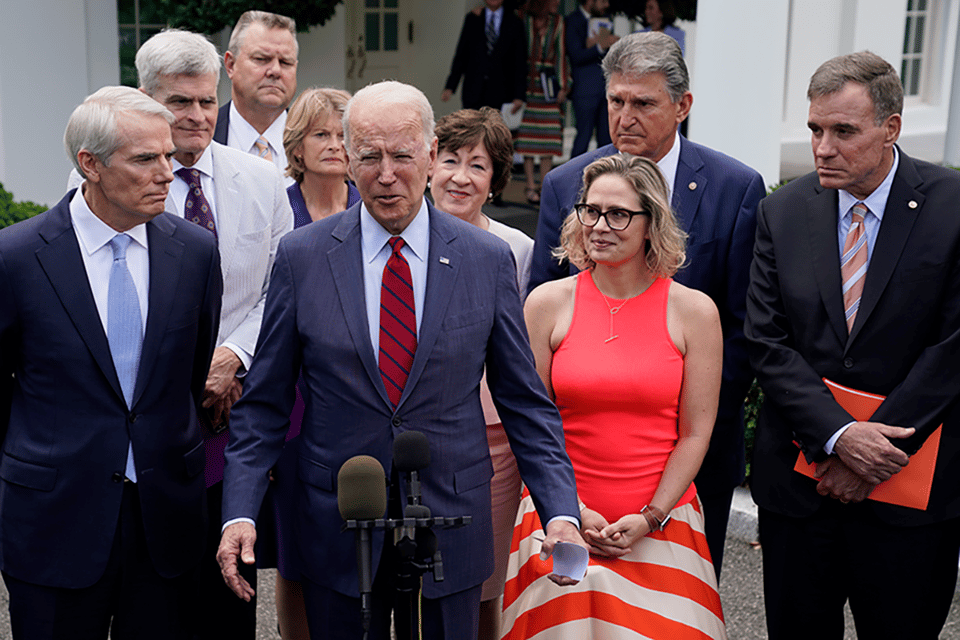Memo Published June 30, 2021 · Updated June 30, 2021 · 8 minute read
Bipartisan Infrastructure Deal + Reconciliation Can Take Bold Steps Forward on Climate and Clean Energy
Josh Freed & Ryan Fitzpatrick

President Joe Biden has reached a deal with a bipartisan group of Senators on an important package that delivers on the President’s promise to make long-needed upgrades to the nation’s infrastructure and put Americans back to work. The package would take critical steps toward cutting carbon pollution by investing in clean energy technologies, upgrading our grid, and making transportation cleaner. These specific provisions should be celebrated and supported.
The bipartisan infrastructure proposal alone, however, is not sufficient to put the country on a path to avoid the worst damages of climate change or to keep the nation competitive in growing clean energy markets. Republicans have successfully thwarted the incremental steps we should have been taking over the past two decades to transition the country to a low-carbon economy. That’s why, in addition to the bipartisan package, Democrats are right to pursue a reconciliation package to finish the job.
This memo highlights several of the most impactful provisions for clean energy and climate in the bipartisan infrastructure proposal. It also points out some of the many vital investments and incentives that must still be taken care of in a bold reconciliation bill so that, combined, these packages will put the United States on track to tackle pressing issues for US workers, our economy, and the climate. If you would like more details on any of these items, please contact Ryan Fitzpatrick ([email protected]) or Josh Freed ([email protected]).
What’s to Like on Climate and Clean Energy in the Bipartisan Deal?
The bipartisan infrastructure proposal contains some truly important provisions that policymakers, advocates, and American voters should be excited about. Here are a few items Third Way finds particularly impressive:
- Accelerating Energy Innovation: Invests $7 billion in a dozen Department of Energy programs to bring emerging, carbon-free technologies into the market. These projects can help launch new domestic industries that boost employment and carbon-cutting opportunities, but they also have immediate economic impacts.
- Transforming the Grid: Includes roughly $25 billion in funding for transmission, smart grid, and grid resilience projects, while providing new assistance for siting and financing.
- Expanding Access to EV Charging: Steers $7.5 billion to alternative vehicle fueling infrastructure, which should be used to make a significant down payment on an electric vehicle charging network.
- Making Transit Even Cleaner: Provides $7.5 billion to help communities purchase electric buses and other clean transit vehicles.
- Managing Carbon Emissions: Puts more than $5 billion toward infrastructure to transport and safely store captured carbon underground, and develop commercial uses that turn carbon into products and jobs, instead of climate pollution.
- Deploying Carbon-Free Fuels: Invests $9.5 billion to jumpstart domestic production of clean hydrogen, which will be critical for decarbonizing power, industry, and transportation.
- Pulling Carbon from the Air: Provides $3.5 billion for multiple regional hubs for direct air capture, which will allow for industry and job growth around this vital climate solution to flourish across the country.
- Staying Competitive in Batteries: Dedicates $6 billion to materials processing, manufacturing, and recycling for batteries. This will reduce US reliance on exporters like China and deliver more of the benefits of a clean economy to US workers.
- Preserving our Largest Source of Clean Power: Provides $6 billion over five years for a competitive program to keep financially struggling nuclear power plants online, give the US a better shot of meeting emissions goals, and save thousands of good-paying clean energy jobs.
- Improving Home Energy Efficiency: Boosts the Weatherization Assistance Program by $3.5 billion, helping more low-income households cut energy waste and save money.
- Recovering from Fossil Production: Puts a total of $16 billion toward capping gas wells and cleaning up mining sites that have been abandoned. This will result in job creation, less greenhouse gas and other pollution, and greater opportunity for fossil-reliant communities to rebuild in a clean economy.
What We Need in Reconciliation to Finish the Job on Climate and Clean Energy
The U.S. has little time left to make sure American workers, industries, and communities can reap the benefits of a global shift to clean energy, slash emissions, and avoid the worst damages of climate change. The infrastructure package is an important start but, unfortunately, a bipartisan effort was never going to meet our climate and energy needs on its own. That’s why a bold reconciliation bill is absolutely necessary to tackle remaining priorities. President Biden recently said reconciliation must focus on new provisions and not expand on initiatives already in the bipartisan package. And of course, the President must honor his commitments to the Senators with whom he struck that deal. But we are confident that the provisions we need to address the climate emergency can be addressed in the reconciliation package without violating that pledge. Below are some of the priorities that the White House and congressional Democrats should ensure are dealt with in reconciliation:
- Strengthen Clean Energy Tax Incentives: The bipartisan proposal does not include the wide range of tax incentives that must be created, extended, or expanded to ensure rapid deployment of existing and emerging clean energy technologies, expand domestic manufacturing capabilities, and make clean solutions affordable and accessible for US consumers. Priorities include incentives for carbon-free power, nascent technologies, carbon use and sequestration, clean hydrogen production, electric vehicles and charging infrastructure, transmission, building and retooling of clean energy manufacturing facilities, sustainable aviation fuels, and a tax policy alternative to support existing nuclear plants, among others.
- Ensure Utilities Continue Shifting to Clean Energy: If we want to rapidly decarbonize the electric grid, it will take more than tax credits for power generators. While a clean energy standard (CES) is the ideal complement to tax credits, Democrats can and should enact a policy designed to have a similar impact while staying within the bounds of reconciliation. This policy sets a performance target for companies that sell power to customers, encouraging them to sell a higher percentage of clean power each year. If they meet the target, companies receive a payment from the government. Otherwise, they pay a fee for each megawatt-hour they’ve fallen short. Combined with tax incentives, this would put the US on the path to reach 80% clean electricity by 2030.
- Boost EV Charging: At least $15 billion in federal funding for EV charging infrastructure is needed to accommodate a complete transition to EVs, as noted in the American Jobs Plan. The bipartisan package only gets us halfway there, so a reconciliation bill must make up the difference by providing an additional $7.5 billion in grants, and should take steps to ensure charging infrastructure is deployed in underserved communities that may otherwise be left behind in our transition to clean vehicles.
- Meet Transmission Needs: The US needs $70-90 billion in targeted transmission infrastructure investments just to get to a 50% renewable grid by 2030, with several times that much needed to fully decarbonize by 2050. Transmission investments in the bipartisan deal are a step in the right direction, but billions more must be added to programs like the revolving loan fund, in addition to tax incentives as outlined in the American Jobs Plan.
- Clean Energy Manufacturing and Industrial Decarbonization: The bipartisan compromise is missing tens of billions of dollars outlined in the American Jobs Plan to keep US industries competitive in a clean economy. Additional funding will be needed to help American companies build and retool facilities that make clean energy products and components, demonstrate new carbon-cutting tools and processes, offset some of the cost of decarbonizing heavy-emitting manufacturing sectors, and develop the workforce and supply chains required for the US to succeed.
- Expand Financing Programs: The proposal allows more manufacturers to take advantage of clean vehicle financing assistance and removes some hurdles that have inhibited lending from DOE’s Loan Programs Office. But it raises new barriers with requirements around “subordination” and fails to restore the $3 billion in credit subsidy Republicans insisted on raiding in the 2020 end-of-year package. It’s also missing an “accelerator” that could support state and local green banks and unlock private investment for clean energy projects, and should be capitalized with up to $100 billion.
- Invest in Natural Infrastructure: Natural infrastructure isn’t Third Way’s expertise, but we know that proper management of public lands and waters has a vital role to play in mitigating and adapting to climate change, while driving economic growth and creating healthier communities. For details on how to advance these issues through an infrastructure or reconciliation bill, we suggest reaching out to our friends at National Wildlife Federation. (Shannon Heyck-Williams, Director of Climate and Energy Policy, [email protected])
- Target Community Investment: The bipartisan bill includes several provisions that could assist areas of the country that have relied economically on fossil fuels. A reconciliation bill should target assistance to these and other distressed and underserved communities. This includes low-income and communities of color, communities that have historically been subjected to environmental harms, and those struggling with the loss of industries and jobs.
Democrats have a chance to score a meaningful, bipartisan win with an infrastructure package, and follow it up with a reconciliation bill that makes generational investments to keep our economy competitive and deliver the additional climate solutions we need right away. Want to discuss how to maximize this opportunity in any of the policy areas mentioned above? Contact Ryan Fitzpatrick ([email protected]) or Josh Freed ([email protected]).

